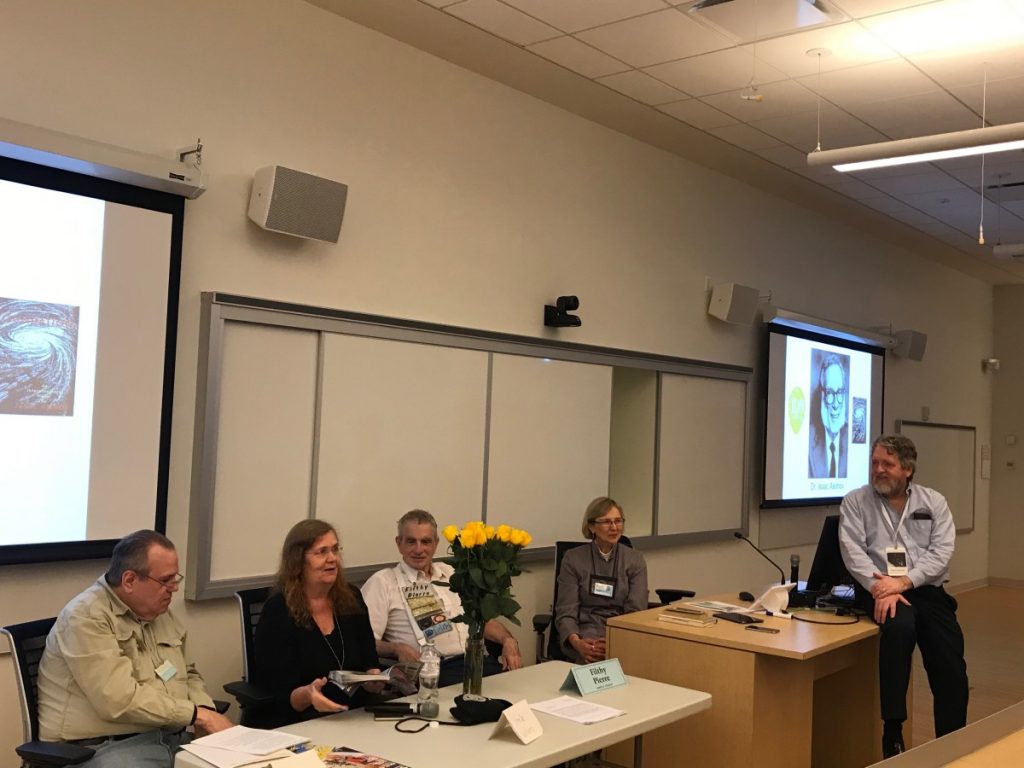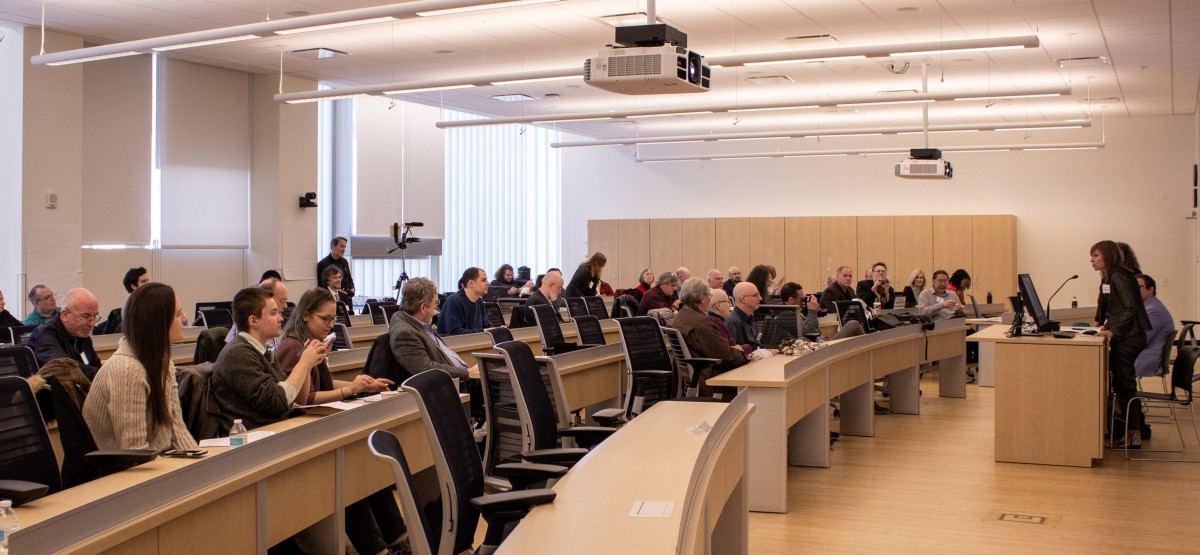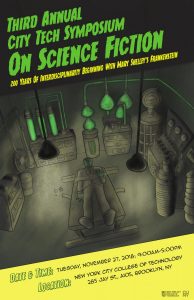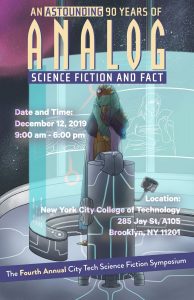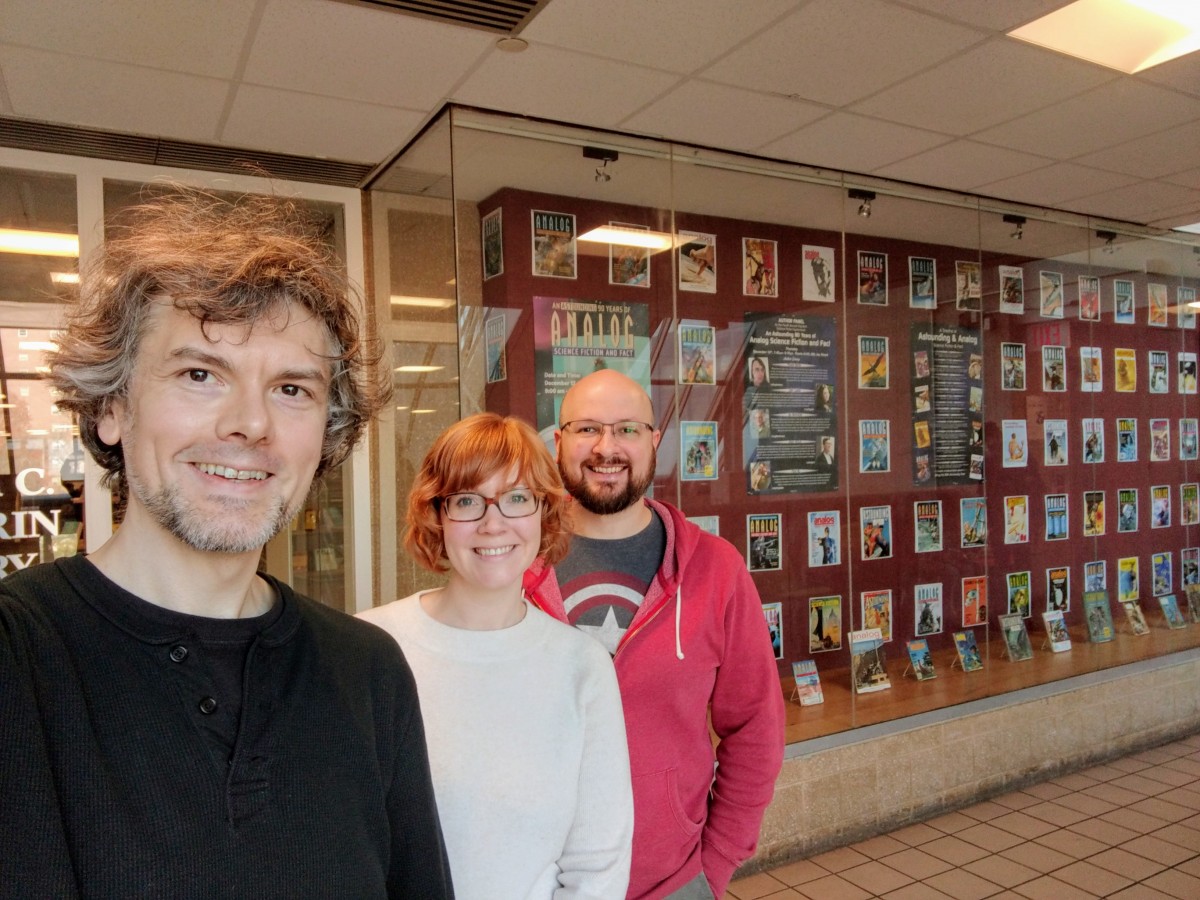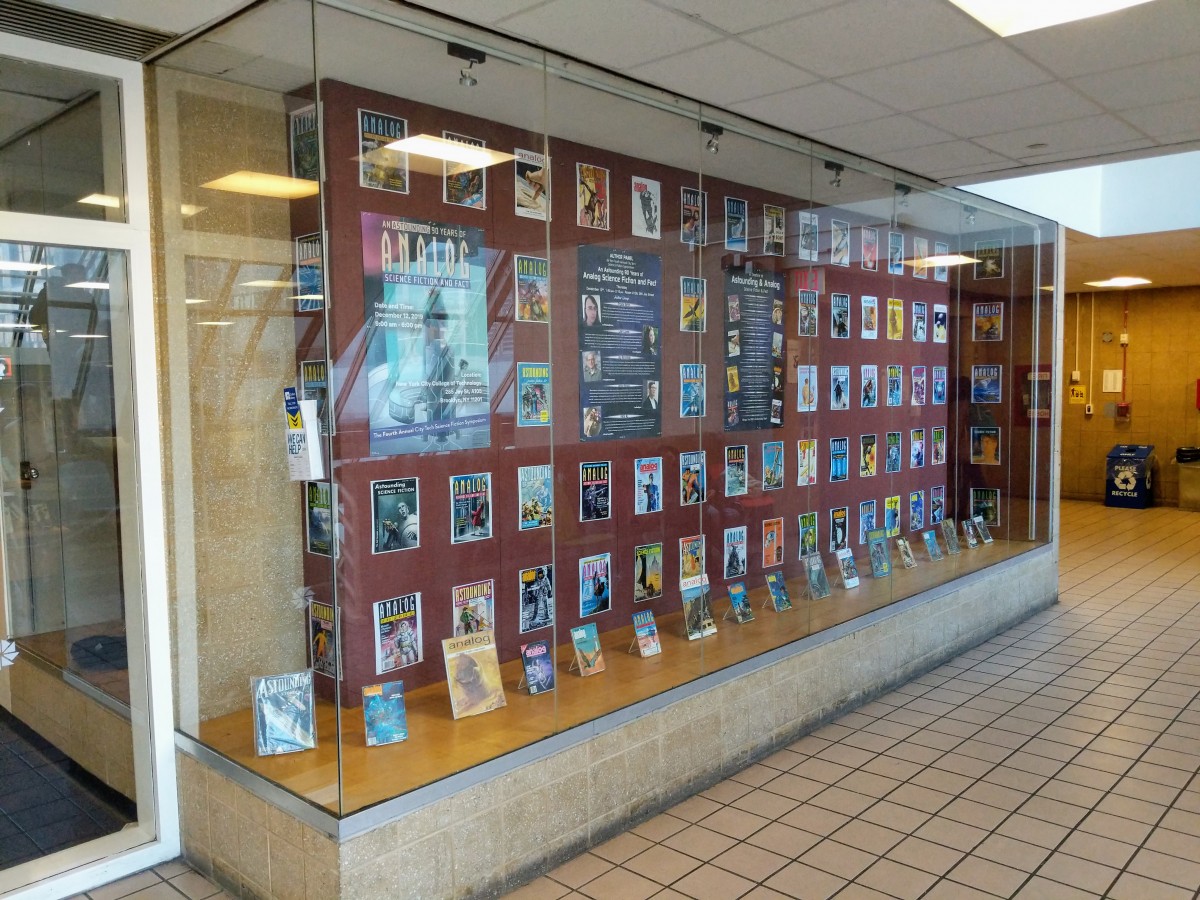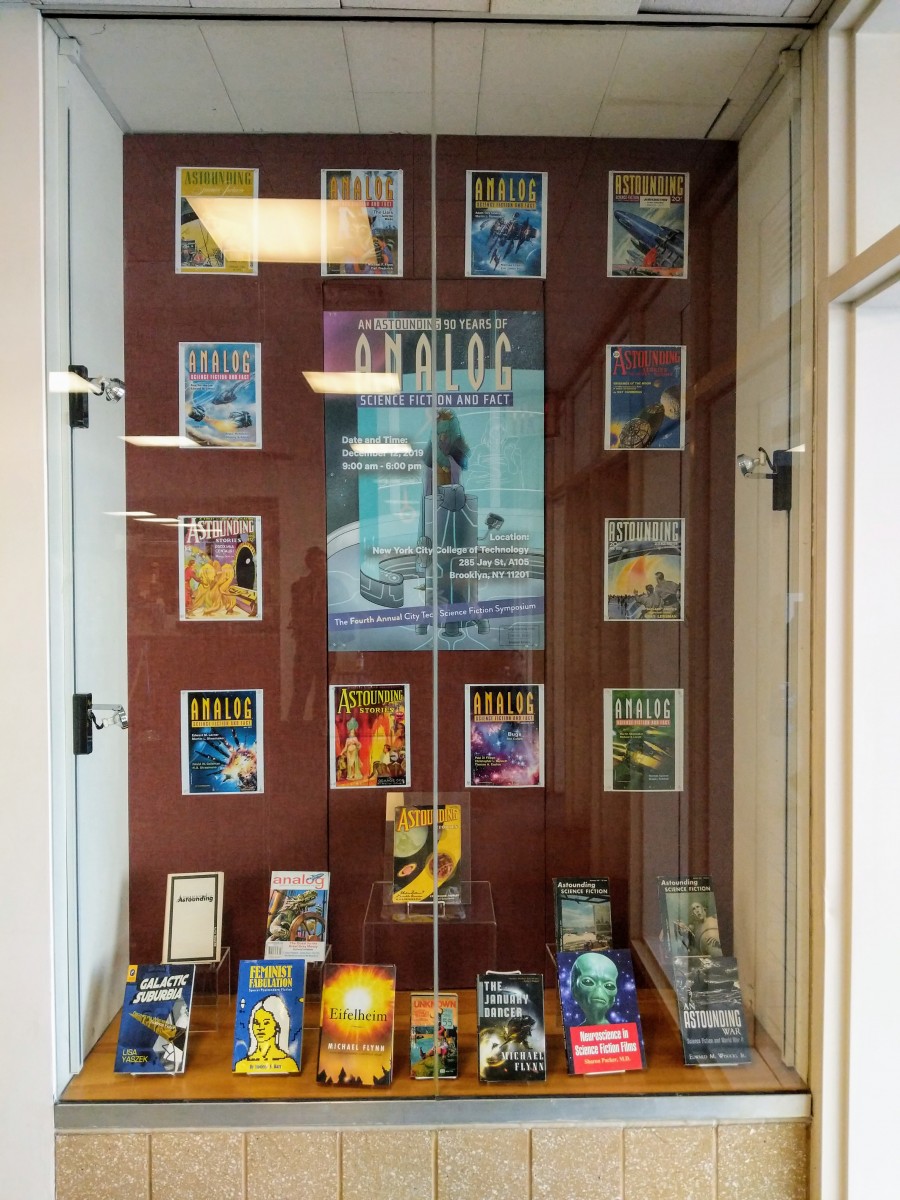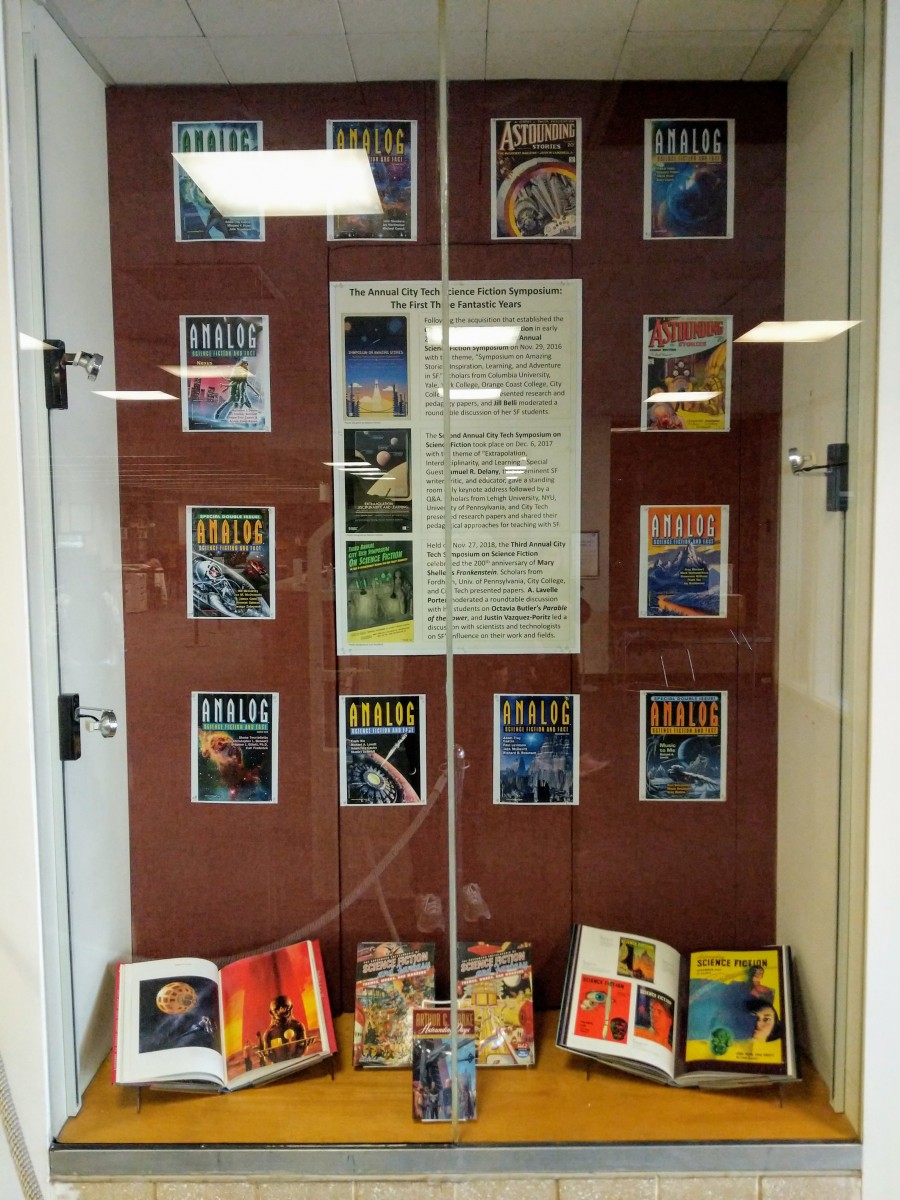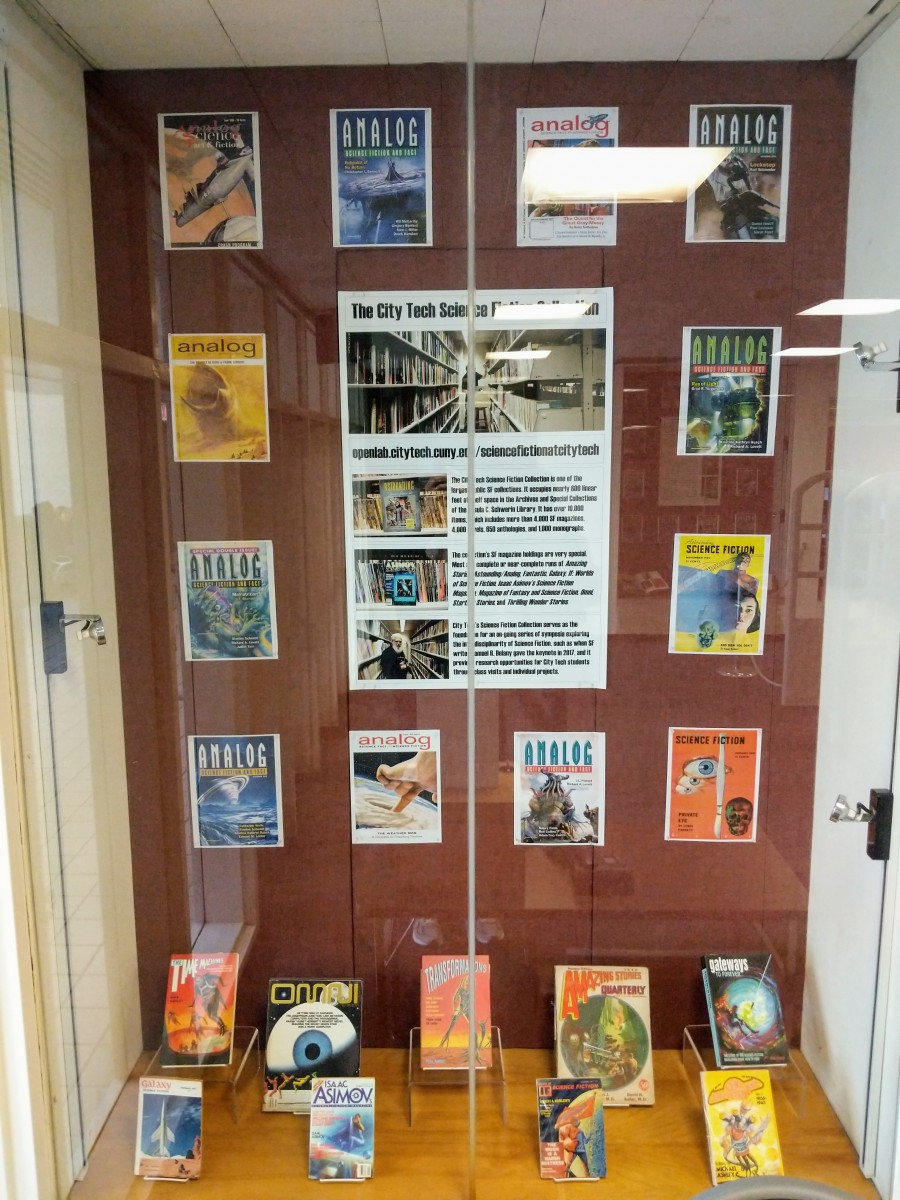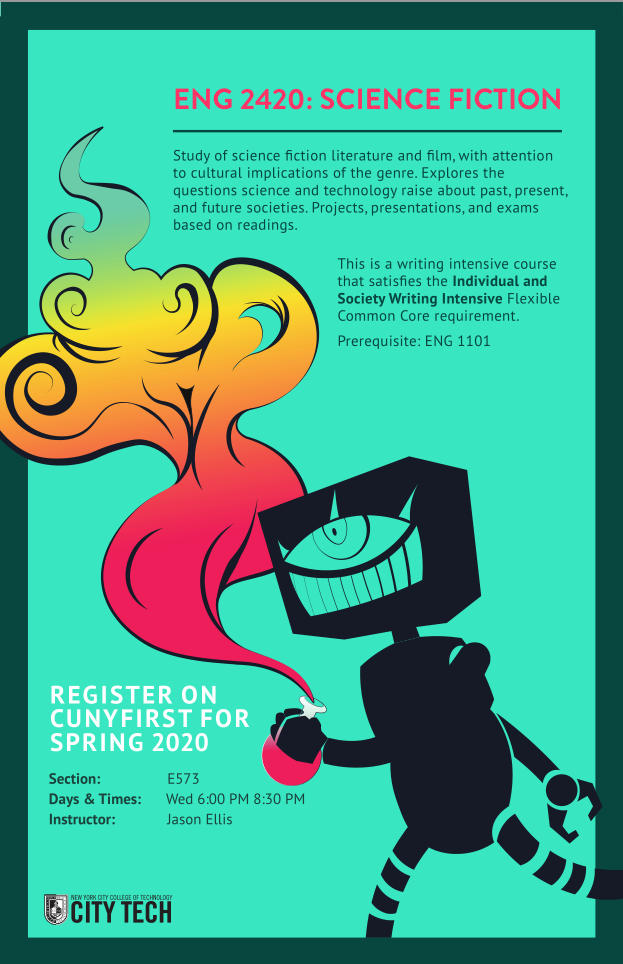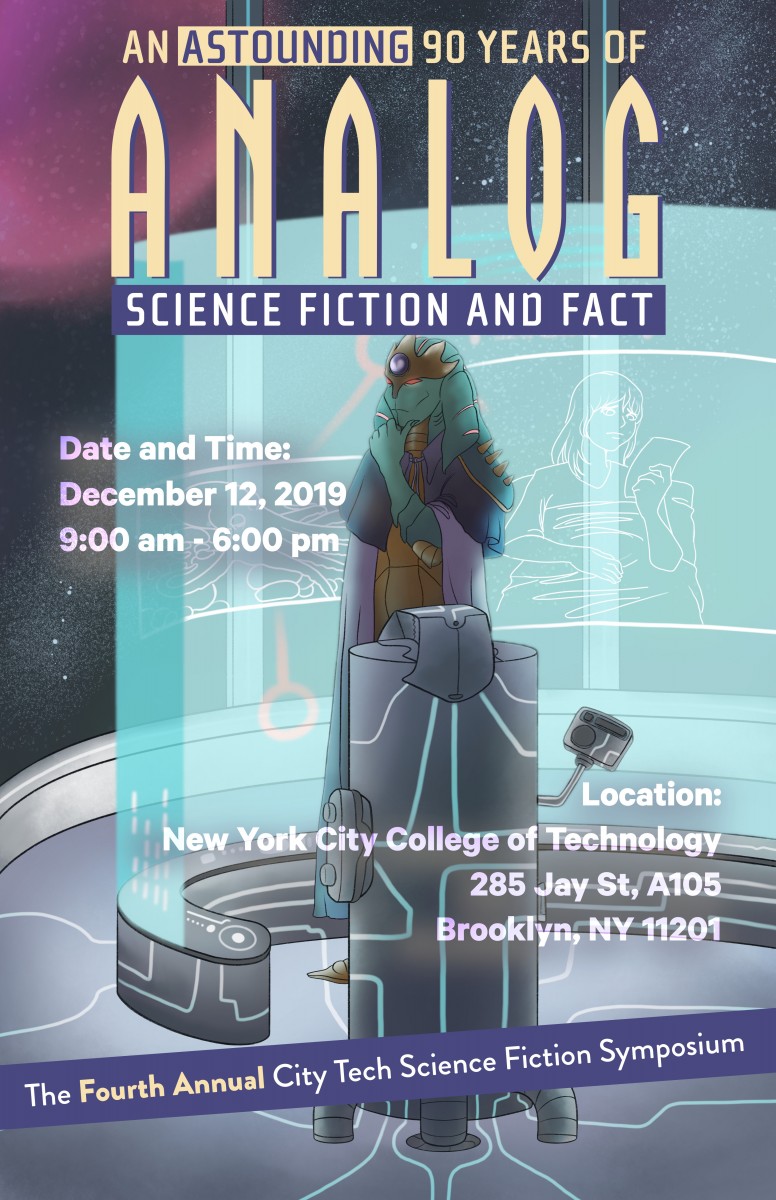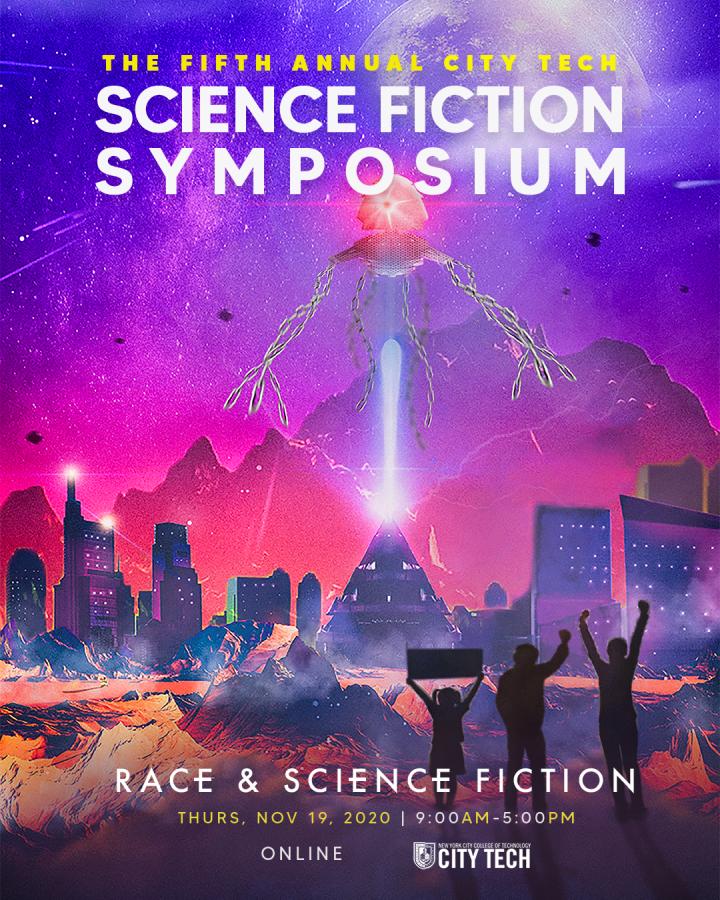
Table of Contents
Registration and Viewing
The Fifth Annual City Tech Science Fiction Symposium on Race and Science Fiction will be held on Thursday, Nov. 19 from 9:00am-5:00pm online via Zoom Webinar.
To participate in this free event, attendees will need to (1) Signup for a free Zoom account here (if you don’t already have one), and (2) Register here to receive access instructions to the Zoom Webinar. Participants may register any time before or during the event!
For those who would like to watch the event without registering, you can join the YouTube Livestream here.
In addition to the Zoom Webinar Chat and YouTube Live Chat, join the event conversation with the event hashtag #CityTechSF and follow us on Twitter @CityTechSF.
As indicated below in the program, some symposium content is pre-recorded to offer more time for discussion on the day of the event. Pre-recorded content includes author readings and full paper presentations. Some of this content is in production and will be posted soon.
Program
9:00AM–9:15AM
Opening
Jason W. Ellis
Justin Vazquez-Poritz, Dean of the School of Arts and Sciences
9:15AM–9:55AM
Roundtable: Literary Afrofuturism in the Twenty-First Century
Moderator: Lisa Yaszek
Panelists:
Rebecca Holden
Isiah Lavender III
Nedine Moonsamy
Lisa Yaszek
9:55AM–10:00AM
Break
10:00AM–10:50AM
Paper Session 1: Pedagogy
Moderator: Jill Belli
Doug Davis – Teaching Afrofuturism with Open Educational Resources
Sadia Reza – Theory of Mind, the “Other,” and Composition
Peter Sands – Morrison’s Paradise: Slow Pedagogies for Generating Deep Conversations about Race
10:50AM–11:55AM
Paper Session 2: Film
Moderator: Wanett Clyde
Jacob Adler – A Sickness Known as Hate: Race and Identity in the Twilight Zone
Kanta Dihal and Stephen Cave – The Whiteness of the AI Uprising (in UK, 4 hours ahead)
Sharon Packer – Sinophobia and Tibetophilia: Recurring Racist Memes in SF Cinema and Comics
Jessica Wagner Webster – Race, Propaganda, and Sci-Fi/Horror Films During World War II
11:55AM–12:00PM
Break
12:00PM–12:45PM
Student Roundtable: “If you had that kind of power … What would you do? What would you change?”: Thinking Critically about Race and Science Fiction
Moderator: Jill Belli
Students from Science Fiction, ENG2420:
Oscar Abundez,
Derick Bardales
Khoury Douglas
Ronald Gordon
Tommy Su
12:45PM–12:50PM
Break
12:50PM–1:35PM
Paper Session 3: Pulps and Golden Age SF
Moderator: Lucas Kwong
Christopher Leslie – “The Menace of Mars”: Resistance to White Male Privilege in Golden Age Science Fiction
Steven Shaviro – Exorcising Lovecraft | View Expanded Presentation
1:35PM–1:40PM
Break
1:40PM–2:45PM
Roundtable: Science Fiction Writers
Organizer: Emily Hockaday
Moderator: Joy Sanchez-Taylor
Panelists:
Alaya Dawn Johnson | Reading from “Reconstruction”
Cadwell Turnbull | Reading “Loneliness in Your Blood”
Erin Roberts | Reading from “Sour Milk Girls”
Carlos Hernandez | Reading from Sal and Gabi Break the Universe
2:45PM-2:50PM
Break
2:50PM–4:10PM
Paper Session 4: Theories and Readings of Otherness and Representation
Moderator: Ann Matsuuchi
Matthew David Goodwin – Gloria Anzaldua and the Making of an Alien Consciousness
Subhalakshmi Gooptu – Livepods and Seedlings: Legacies of Colonial Labor in Contemporary Science Fiction
Rebecca Hankins and Muhammad Aurangzeb Ahmad – Islamicate Afrofuturuism: Visions of Muslim Afrofuturism and Beyond
Kathrin Lachenmaier – Defying the Colonial ‘Story of Indigenous Deficiency’ in Louise Erdrich’s Future Home of the Living God | View Expanded Presentation
Aaron Zwintscher – But They Aren’t Human and They Don’t Complain …: Writing Race(s), Diversity, and the Colonial Mindset on Roshar and Elsewhere in Brandon Sanderson’s Cosmere
4:10PM–4:15PM
Break
4:15PM-5:00PM
Keynote Address by Jonathan W. Gray on “Past Tense, Future Perfect: American Atrocities in HBO’s Watchmen and Lovecraft Country“
Introduction: A. Lavelle Porter
Participants
Oscar Abundez is a Mechanical Engineering Technology student at City Tech.
Jacob Adler has worked in library cataloging for many years. He was a cataloger at The Paley Center for Media in New York from 2010 to 2016, and has been working as the Metadata/Cataloging Librarian at Bronx Community College since 2017. He obtained an MS in Library and Information Science from the Palmer School of Library and Information Science in 2016, and is currently pursuing a master’s degree in Museum Studies from the CUNY School of Professional Studies.
Muhammad Aurangzeb Ahmad is an Affiliate Assistant Professor in the Department of Computer Science at University of Washington and the Principal Research Scientist at KenSci. Muhammad Aurangzeb has published over 50 research papers in machine learning and artificial intelligence. He has a PhD in Computer Science from University of Minnesota. He is also the founder and editor of the Islam and Science Fiction project, which is the most comprehensive resource on the subject. He has edited or co-edited two anthologies on Science Fiction with Islamic influences.
Derick Bardales is a Business and Technology of Fashion student at City Tech.
Jill Belli is Associate Professor of English at New York City College of Technology, CUNY, where she happily teaches science fiction and utopian studies often. She’s working on long-standing projects on well-being & happiness in education and writing & revising in dystopian texts. Newer interests include looping as composing practice, tarot and astrology as storytelling and knowing, William Reynolds, and grief. Learn more about Jill and her interdisciplinary research and teaching: jillbelli.org.
Stephen Cave is Executive Director and Senior Research Fellow at the Leverhulme Centre for the Future of Intelligence, University of Cambridge.
Wanett Clyde is the Collections Management Librarian at City Tech. She researches the intersection of Fashion & Black history.
Doug Davis is professor of English at Gordon State College in Barnesville, GA, where he teaches literature and writing. He has published essays on topics ranging from fictions of nuclear war and terrorism to teaching southern literature and Flannery O’Connor. Most recently, he guest-edited two special issues of The Flannery O’Connor Review on the theme of science and technology in O’Connor’s fiction.
Kanta Dihal is a Senior Research Fellow at the Leverhulme Centre for the Future of Intelligence, University of Cambridge. She is the Principal Investigator on the Global AI Narratives project, which explores intercultural public understanding of artificial intelligence as constructed by fictional and nonfictional narratives. She obtained her DPhil in science communication at the University of Oxford in 2018. Kanta’s work intersects the fields of science communication, literature and science, and science fiction. She is co-editor of AI Narratives: A History of Imaginative Thinking About Intelligent Machines (2020) and is currently turning her DPhil thesis into a monograph.
Khoury Douglas is a Mechanical Engineering Technology student at City Tech.
Jason W. Ellis is an Assistant Professor of English at the New York City College of Technology, CUNY, where he coordinates the City Tech Science Fiction Collection. He coedited The Postnational Fantasy: Postcolonialism, Cosmopolitics and Science Fiction (McFarland, 2011) and a special issue on Star Wars: The Force Awakens of New American Notes Online, and talked with Dr. Neil deGrasse Tyson about the relationship between SF and society on StarTalk Radio. He holds a Ph.D. in English from Kent State University, M.A. in Science Fiction Studies from the University of Liverpool, and B.S. in Science, Technology, and Culture from Georgia Tech.
Matthew David Goodwin is a scholar, an editor, and a translator. His research is centered on the experience of migration, in particular how Latinx writers are using science fiction and fantasy to explore migration. He is the editor of Latinx Rising: An Anthology of Latinx Science Fiction and Fantasy as well as the forthcoming young adult collection Speculative Fiction for Dreamers. His study of Latinx science fiction, The Latinx Files: Race, Migration, and Space Aliens will be published with Rutgers University Press in 2021. He is currently a visiting scholar at the Institute for Advanced Studies in Princeton. His PhD is in Comparative Literature from the University of Massachusetts.
Subhalakshmi Gooptu is a doctoral candidate in English at the University of Massachusetts Amherst. She is a Writing Fellow at UMass’ Biochemistry and Molecular Biology department and a research associate at the Five College Women’s Studies Research Center. Her dissertation project archives contemporary literary productions that engage with transnational, decolonial and labor migrations. Particularly, through an assemblage of representations of birth, inheritance and reproduction in South Asian and Caribbean diasporic writing.
Ronald Gordon is a Communications Design student at City Tech.
Jonathan W. Gray is Associate Professor of English at John Jay College, CUNY and the CUNY Graduate Center. He is the author of Civil Rights in the White Literary Imagination published by University Press of Mississippi. He is currently working on a book project titled Illustrating the Race: Representing Blackness in American Comics which traces depictions of African Americans in comics from 1966 to the present by investigating how the twin notions of illustration–the creative act of depiction and the political act of bringing forth for public consideration–function in these texts. Prof. Gray co-edited the essay collection Disability in Comics and Graphic Novels for Palgrave McMillian and formerly served as the founding editor of the Journal of Comics and Culture (Pace). Prof. Gray’s journalism on popular culture has appeared in The New Republic, Entertainment Weekly, Medium, and Salon.com.
Xavier Guerrero designed the poster for The Fifth Annual City Tech Science Fiction Symposium on Race and Science Fiction. He is a BFA in Communication Design/Graphic Design student at City Tech and a self-taught photographer. In his spare time, he likes to explore the city and practice photography. See some of his photos on Instagram and other examples of his work in his online portfolio.
Rebecca Hankins is the Wendler Endowed Professor and certified archivist/librarian at Texas A&M University. She is an affiliated faculty in the Interdisciplinary Critical Studies Program that includes Africana, Women’s & Gender, and Religious Studies. Her work has appeared in The International Review of African American Art, Critical Muslim, Foundation, American Archivist, RUSQ, and most recently an essay titled “Practicing Islam in the time of COVID-19” freely available in the eBook, Religion in Quarantine: The Future of Religion in a Post-Pandemic World edited by TAMU Communication’s Professor Heidi Campbell.
Carlos Hernandez (he/him) is the author of the Pura Belpre-award winning Sal and Gabi Break the Universe (2019), as well as its sequel, Sal and Gabi Fix the Universe (2020) and the short story collection The Assimilated Cuban’s Guide to Quantum Santeria (2016). He is also a CUNY associate professor of English at BMCC and the Graduate Center, as well as a game writer and designer. Find him on socials @writeteachplay.
Rebecca J. Holden is a fan and scholar of feminist and African American science fiction. She earned her PhD in English from the University of Wisconsin-Madison in 1999 and is currently a Senior Lecturer in the Professional Writing Program at the University of Maryland, College Park. Holden has published essays and reviews on various science fiction writers and books in Foundation, Science Fiction Studies, Oxford Bibliographies in American Literature, LA Review of Books, Women of Other Worlds: Excursions through Science Fiction and Feminism, and Luminescent Threads: Connections to Octavia Butler. Holden has served as a reviewer for Extrapolation, African American Review, and the Masters of Science Fiction series from the University of Illinois Press. With Nisi Shawl, Holden coedited and contributed to Strange Matings: Science Fiction, Feminism, African American Voices, and Octavia E. Butler (2013). She also edited a collection of essays on WisCon, a feminist science fiction convention, titled Regenerating WisCon (2014). In 2014, Holden cochaired the annual SFRA (Science Fiction Research Association) conference.
Alaya Dawn Johnson is the author of seven novels for adults and young adults. Her most recent novel for adults, Trouble the Saints, was released in July 2020 from Tor books. A short story collection, Reconstruction, is forthcoming in November 2020 from Small Beer Press. Her young adult novel The Summer Prince was longlisted for the National Book Award for Young People’s Literature, while her novel Love Is the Drug won the Andre Norton/Nebula Award for Middle Grade/Young Adult fiction. Her short stories have appeared in many magazines and anthologies, including Best American Science Fiction and Fantasy 2015, A Phoenix First Must Burn, Feral Youth, and Zombies vs. Unicorns. She lives in Mexico where she received a master’s degree with honors in Mesoamerican Studies at the Universidad Nacional Autónoma de México, for her thesis on pre-Columbian fermented food and its role in the religious-agricultural calendar.
Lucas Kwong is an assistant professor of English at New York City College of Technology. His scholarship on fantastic fiction, religion, and colonialism has been published in Victorian Literature and Culture, Religion and Literature, and Journal of Narrative Theory. He also serves as the assistant editor for New American Notes Online, an online interdisciplinary scholarly journal, and as editor for City Tech Writer, a journal of student writing. He lives in Brooklyn with his wife.
Kathrin Lachenmaier is a master’s student at the University of Cologne, Germany, pursuing a degree in English Studies and is enrolled in the Research Master program at the a.r.t.e.s. Graduate School for the Humanities Cologne. She holds a bachelor’s degree in English and German Studies (2019). Her research interests include American literature and culture, North American Indigenous literatures, Indigenous Futurism, science fiction, and ecocriticism.
Isiah Lavender III is Sterling Goodman Professor of English at the University of Georgia, where he researches and teaches courses in African American literature and science fiction. In addition to his books Race in American Science Fiction (Indiana UP, 2011), Black and Brown Planets: The Politics of Race in Science Fiction (UP of Mississippi, 2014), Dis-Orienting Planets: Racial Representations of Asia in Science Fiction (UP of Mississippi, 2017), and Afrofuturism Rising: The Literary Prehistory of a Movement (Ohio State UP, 2019), his publications on science fiction include essays and reviews in journals such as Extrapolation, Journal of the Fantastic in the Arts, and Science Fiction Studies, and collections such as the Cambridge History of Science Fiction and the Routledge Companion to Science Fiction. His co-edited critical anthology Literary Afrofuturism in the Twenty-First Century with Lisa Yaszek (Ohio State UP) was recently published in 2020 as well as “Beyond Afrofuturism,” the special double issue of Extrapolation, again co-edited with Yaszek. His current projects include: The Routledge Handbook of Alternative Futurisms (co-edited with Bodhisattva Chattopadhyay, Grace Dillon, and Taryne Jade Taylor), the interview collection Conversations with Nalo Hopkinson, and the monograph “Critical Race Theory and Science Fiction.” Finally, he edits for Extrapolation—the oldest science fiction journal—as one of its six editors.
Christopher Leslie, a two-time winner of a Fulbright fellowship, has taught at Hunter College, John Jay College, New York University, Universität Potsdam, and the South China University of Technology. Dr. Leslie took his M.A. and Ph.D. from the City University of New York Graduate Center. His research interests include the interactions among science, technology, and culture.
Ann Matsuuchi is an instructional technology librarian and professor at LaGuardia Community College, CUNY. Writing projects include those that focus on Samuel R. Delany and Wonder Woman, sf tv shows such as Doctor Who, and using Wikipedia to teach the work of Octavia E. Butler.
Nedine Moonsamy is a Senior Lecturer in the English Literature department at the University of Pretoria. She is currently writing a monograph on contemporary South African fictionand otherwise conducts research on science fiction in Africa. She has held research fellowships at The Institute for African and Asian Studies, Humboldt University, Berlin (2017) and at the Visual Cultures Department at Goldsmiths College, University of London (2019). She is currently a researcher on the Urban Cultures and Popular Imaginaries in Africa project (UCAPI, Rhodes University). The Unfamous Five is her debut novel (Modjaji Books 2019).
Sharon Packer, MD is a physician and psychiatrist who is affiliated with Mount Sinai Beth Israel and who is the author of Neuroscience in Science Fiction Film and Superheroes and Superegos and the co-editor of Welcome to Arkham Asylum: Essays on Psychiatry and the Gotham City Institution and other books and articles.
A. Lavelle Porter is an Assistant Professor of English at New York City College of
Technology. He holds a B.A. in history from Morehouse College and a Ph.D. in
English from the CUNY Graduate Center. His writing has appeared in venues such as
The GC Advocate, Callaloo, The New Inquiry, Poetry Foundation, and the African
American Intellectual History Society. He recently published The Blackademic Life: Academic Fiction, Higher Education, and the Black Intellectual with Northwestern University Press.
Sadia Reza has taught Intro to Writing courses at several CUNY colleges. With graduate degrees in English from CUNY and in Sociology from Columbia University, she is either teaching writing or pursuing social research. Her research centers on racialized constructions of science, modernity and education. She also writes science fiction and fantasy of her own.
Erin Roberts is a writer of speculative fiction across formats: her short fiction has appeared in publications including Asimov’s Science Fiction, Clarkesworld, Podcastle, and The Dark and has been selected for three Year’s Best anthologies; her interactive fiction has been published in Sub-Q Magazine; and her nonfiction essays and reviews have appeared on Tor.com and in Cascadia Subduction Zone, People of Colo(u)r Destroy Fantasy, and Strange Horizons, among others. Erin is a graduate of the Odyssey Writers Workshop and holds an MFA from the Stonecoast program at the University of Southern Maine. You can follow her on Twitter at @nirele and read more about her work at writingwonder.com.
Joy Sanchez-Taylor is an Associate Professor of English at LaGuardia Community College (CUNY) whose research specialty is science fiction and fantasy literature by authors of color. She has published articles in Science Fiction Studies, Extrapolation and The Journal of the Fantastic in the Arts. Her book Diverse Futures: Science Fiction and Writers of Color is being published by The Ohio State University Press in Fall 2021.
Peter Sands, Director UWM Honors College and Associate Professor of English, writes mainly about utopias and utopianism, and sometimes about teaching writing and literature courses in digital environments. Also cannibalism.
Steven Shaviro is the DeRoy Professor of English at Wayne State University in Detroit. He writes mostly about science fiction and about music videos. His books include Connected, or What It Means To Live in the Network Society (2003), Discognition (2016), and Extreme Fabulations (forthcoming in 2021).
Tommy Su is a Computer Systems Technology student at City Tech.
Cadwell Turnbull is the author of The Lesson. His short fiction has appeared in The Verge, Lightspeed, Nightmare, Asimov’s Science Fiction and several anthologies, including The Best American Science Fiction 2018 and The Year’s Best Science Fiction 2019. His novel The Lesson was the winner of the 2020 Neukom Institute Literary Award in the debut category. The novel was also shortlisted for the VCU Cabell Award and longlisted for the Massachusetts Book Award. Turnbull lives in Raleigh and teaches at North Carolina State University.
Jessica Wagner Webster is the Digital Initiatives Librarian and Assistant Professor at Baruch College, City University of New York. She holds an MLS in archives and an MA in American History from the University of Maryland. Her responsibilities include digitizing print materials for access, designing long-term archival preservation and access systems, and developing workflows for processing born-digital materials. Her research focuses on film and material culture, trends in archival practice, documentation of underdocumented populations, and collection of student life materials.
Lisa Yaszek is Regents’ Professor in the School of Literature, Media, and Communication, where she explores science fiction as a global language crossing centuries, continents, and cultures. Yaszek’s books include Galactic Suburbia: Recovering Women’s Science Fiction (Ohio State, 2008); Sisters of Tomorrow: The First Women of Science Fiction (Wesleyan 2016); The Future is Female! 25 Classic Science Fiction Stories by Women (Library of America, 2018); and Literary Afrofuturism in the Twenty-First Century (co-edited with Isiah Lavender III, Ohio State, 2020). Her ideas have been featured in The Washington Post, Food and Wine Magazine, and USA Today, and she has been an expert commentator for the BBC4’s Stranger Than Sci Fi, Wired.com’s Geek’s Guide to the Galaxy, and the AMC miniseries James Cameron’s Story of Science Fiction. A past president of the Science Fiction Research Association, Yaszek currently serves as a juror for the John W. Campbell and Eugie Foster Science Fiction Awards.
Aaron Zwintscher, PhD (UCF) is an adjunct professor of English at City Tech. He has previously written about speculative fiction particularly with regard to its relationships with ecology, representation, and hospitality towards both the human and the other-than-human. His monograph Noise Thinks the Anthropoce was published by the open access academic press Punctum Books in 2019 and is freely available to download from their website.
About the Symposium
Following the inauguration of the City Tech Science Fiction Collection in 2016, faculty have organized an annual symposium on Science Fiction. The event is a celebration of the collection and an opportunity to discuss, share, and consider how important Science Fiction is as a literature of interdisciplinarity, imagination, and inspiration.
Wanett Clyde, Jason W. Ellis, Lucas Kwong, and A. Lavelle Porter co-organized this year’s symposium.
About the City Tech Science Fiction Collection
The City Tech Science Fiction Collection contains over 600-linear-feet of near-complete runs of the major science fiction magazines, and an extensive holding of science fiction anthologies, novels, and scholarship. Additionally, there are significant selections of fringe texts, including mystery, horror, and the supernatural. An anonymous donor gifted the original, tremendous collection to City Tech in 2016. It has since grown thanks to additional donations.

